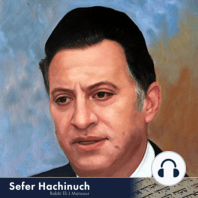20 min listen
Misva #132: Kindling Fire on the Altar
FromSefer Hachinuch
ratings:
Length:
20 minutes
Released:
Feb 3, 2022
Format:
Podcast episode
Description
The Torah commands in Parashat Sav (Vayikra 6:6), “Esh Tamid Tukad Al Ha’mizbe’ah” – a constant fire must burn on the Mizbe’ah (altar) in the Bet Ha’mikdash. The Sefer Ha’hinuch addresses the question of why this command was necessary, given that, according to tradition, a miraculous fire descended from the heavens onto the altar each day. Why did the Torah require the Kohanim to kindle fire on the Mizbe’ah, if fire was already provided via a miracle? The Sefer Ha’hinuch explains that when G-d performs a miracle, He minimizes its supernatural quality. The classic example was the splitting of the sea, which was preceded by strong gusts of wind which blew throughout the night. G-d minimized the supernatural element of this miracle by making strong winds such that the sea appeared to split as a result of wind. He does this, the Sefer Ha’hinuch writes, because it is only those who seek recognition and fame that go out of their way to publicize their actions and put themselves on display. G-d, in His infinite greatness, has no need to prove Himself to anybody; He does not find it necessary to “promote” Himself. Therefore, even when He performs miracles, He does so discreetly, minimizing the suspension of the natural order. Human beings feel a need to attract attention through extraordinary public displays, but G-d has no such need. Therefore, in the Bet Ha’mikdash, too, even though a miraculous fire descended from the heavens, G-d wanted to minimize the miracle by commanding the Kohanim to kindle fire on the altar each day, making it appear as though the fire was lit naturally. The Sefer Ha’hinuch proceeds to offer a second understanding of this Misva, explaining that lighting fire on the altar had an impact upon the people. Human beings, he writes, are composed of a number of different elements, which must all be perfectly balanced and proportioned in order for a person to be healthy and stable. One of these components is fire. The “fire” within a person gives him energy and enthusiasm, and keeps him driven and motivated to act, achieve and produce. If the fire within a person is too strong, the Sefer Ha’hinuch writes, then he develops a fever and falls ill. And if the fire is too low, then a person feels weak and feeble, bereft of energy and rigor. The Sefer Ha’hinuch explains that kindling fire on the altar has an effect upon the “fire” within the people, ensuring that it remains properly balanced. He draws proof from the tragic story of Nadab and Abihu, Aharon’s two older sons, who offered an “Esh Zara” (“foreign fire” – Vayikra 10:1) on the altar, whereupon they were immediately consumed by fire. The additional fire on the altar disrupted their internal equilibrium, resulting in their death by fire. Each morning, the Kohanim would arrange two rows of firewood for the morning Tamid (daily) sacrifice, and they would prepare another two rows later in the day for the afternoon Tamid. This was one of the three fires which burned on the altar. There was a second from which coals were taken for the daily offering of Ketoret (incense), and a third which was lit not for any practical purpose, but strictly to fulfill this Misva. The Torah’s command to kindle a fire on the altar was not functional, to ensure the presence of a fire to burn the sacrifices, but rather required lighting a separate fire on the altar which served no practical purpose. Of course, this Misva applies only in the times of the Bet Ha’mikdash, and only to the Kohanim. If the Kohanim fail to kindle the third fire on the altar, they transgress this Biblical command.
Released:
Feb 3, 2022
Format:
Podcast episode
Titles in the series (100)
Misva #19: The Prohibition Against Eating Hametz on Pesach: Daily Sefer Hachinuch - Brought to you by itorah.com by Sefer Hachinuch
